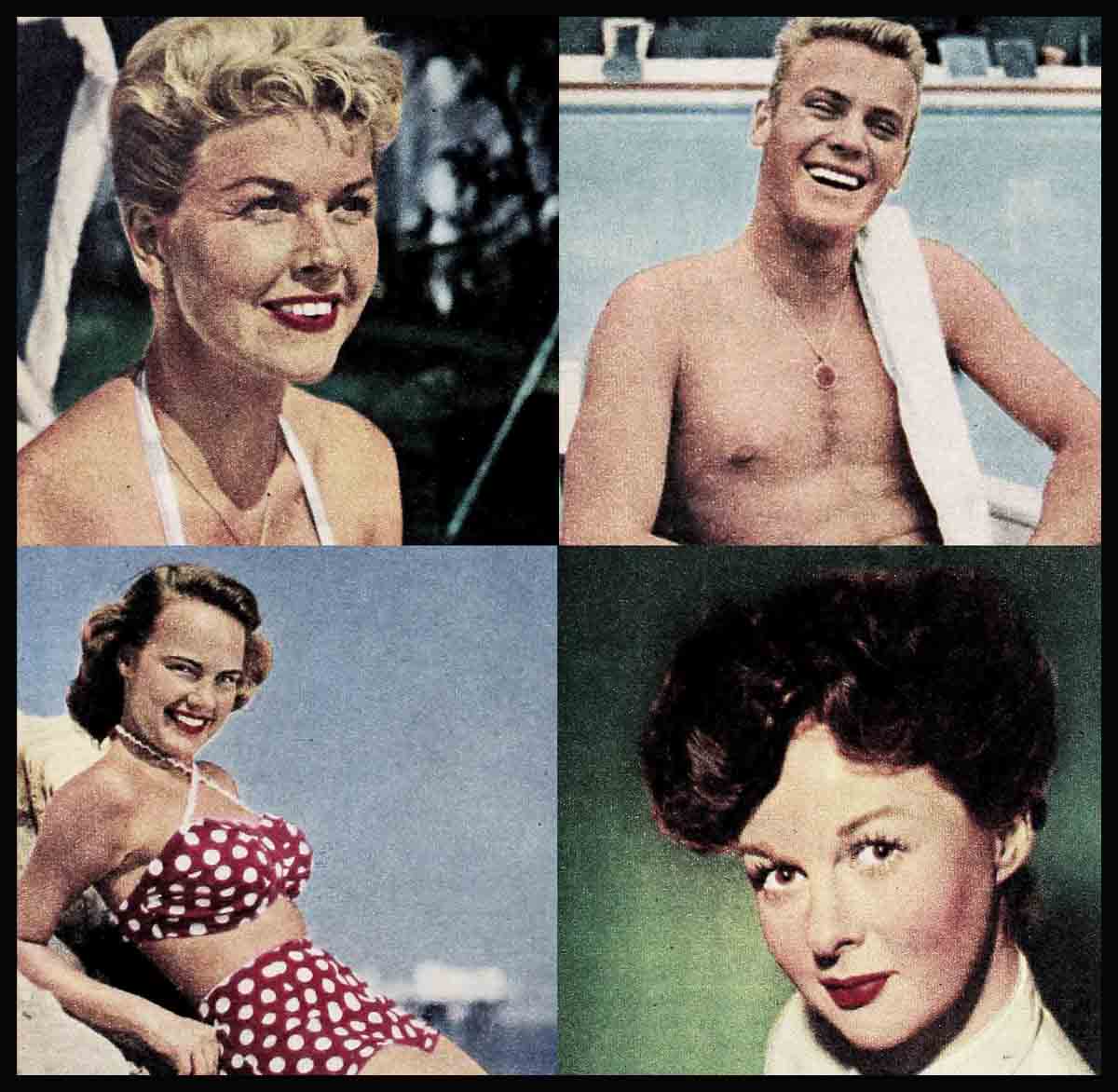
Count Your Blessings
It was only a routine trip with Doris Day, who’s on a gardening kick, having her picture taken at Paul J. Howard’s Flowerland. As the studio’s long, black limousine headed south on Sepulveda Boulevard toward the nursery, Doris chatted away in her usual, gay fashion. Her cornflower-blue eyes registered excitement as the street scenes outside flew by and vanished. Suddenly Doris leaned forward and pressed her face against the glass. In a split second, her mood changed and she was a serious, somber, reflective person. Doris’ hairdresser sitting at her side maintained a discreet silence until Doris spoke.
“Did you see that rundown trailer camp back there?” inquired Doris. “The one with those two weatherbeaten totem poles guarding the entrance?”
Rather than disturb Doris’ trend of thought the hairdresser nodded. The trailer camp had escaped Doris’ companion completely.
“I lived there once,” Doris said seriously. “It was a long time ago when I was first married and life wasn’t exactly—shall we say—a solid bed of roses—not at all.”
“Did you ever dream then that you’d become a successful singer and then a famous movie star?” the hairdresser asked.
“Are you kidding? The only thing I dreamed about was how to cook a meal!

“Experiences such as this play a very important part in one’s life,” Doris added thoughtfully. “When I think of all I have today, my wonderful home and family, peace of mind and contentment, it makes me feel very humble and grateful. I hope I’ll remember to count my blessings, always.”
Like Doris there are many other stars who possess a capacity for gratitude and appreciation that knows no bounds. Rock Hudson, for example, is a rugged realist who counts his blessings for a very special reason.
“Occasionally I get upset and want to blow my top,” the big fellow confesses, “but when this happens a little safety valve reminds me that I’ve never had it so good. This began back when I served as an aviation machinist in Uncle Sam’s Navy.
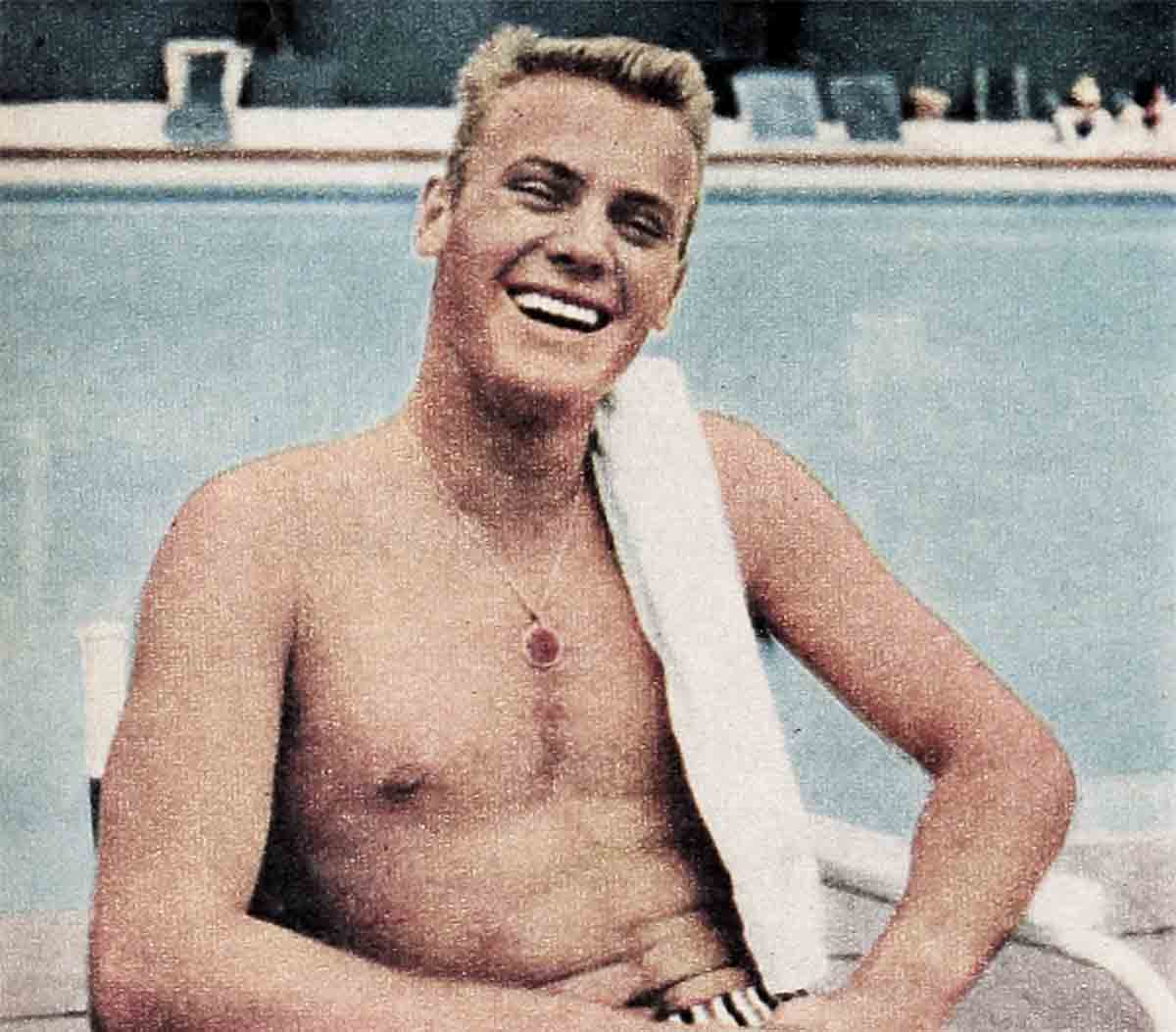
“Heading for the Samoa Islands where I was land-based, I remember a hot, sticky evening, almost unbearable. All of us were going through a rough adjustment period. Some were homesick and each of us wondered what was waiting ahead. How I longed to be alone.
“It sounds incredible, but when I asked permission to anchor my hammock to the highest spot I could reach, it was granted! I promised myself, I’ll remember to be grateful for my freedom and never complain about anything again.”
Breezy, bosomy Terry Moore has been publicized as an uninhibited extrovert. But there’s another side to the little lady who makes headlines. This story would never make the front pages, but it is a story that touched Terry’s heart. Terry was in a Korean hospital last Christmas. Even though her mother was with her, Terry was still a long, long way from home, friends and the beloved festivities of the holiday season.
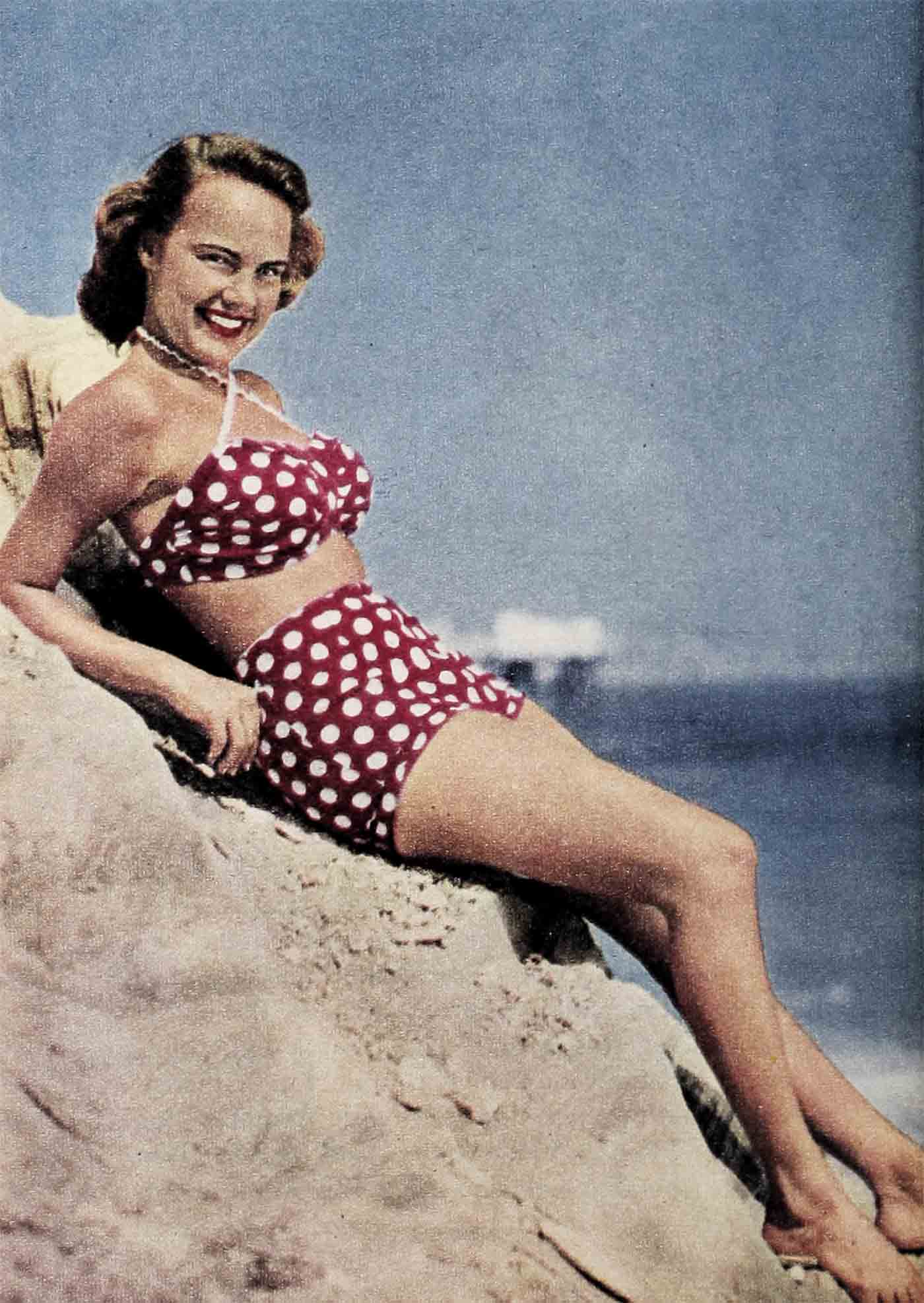
“I guess I was feeling a little sorry for myself,” Terry admits candidly. “Everyone was wonderful to me, but our schedule had been changed and something had happened to my mail. All those Christmas cards I looked forward to receiving from friends were somewhere en route. It just doesn’t seem like Christmas, I thought.”
That same day, Terry went through the wards greeting hospitalized vets. Finally she stopped at the bedside of a soldier who was lying there with a smile on his face. Empty eyes that would never see again stared straight ahead.
“You got here at the right time,” exclaimed the soldier optimistically. “I just received a whole bunch of Christmas cards from home. Will you please read them to me and describe how they look?”
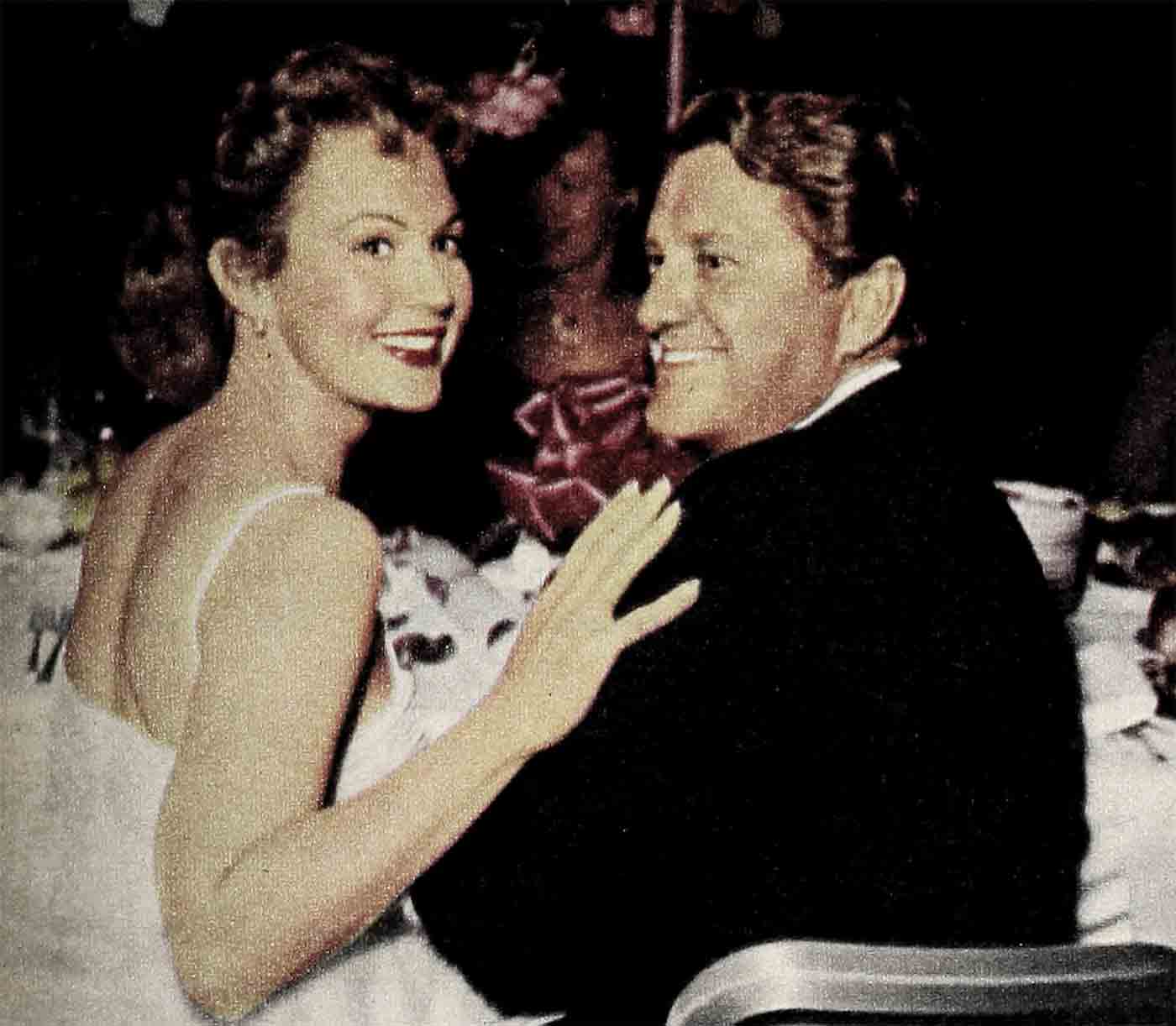
A humble Terry read and described the typical Christmas card scenes—and was grateful.
A mother’s faith and determination to give her son a healthy body and the right to live a normal life gave a boy named Tab Hunter the chance to become a star!
“The story is familiar about my Mom’s struggle to support my brother Walter and me,” Tab says, “but very few people know I was so bowlegged when I was born, the doctors said it was likely that I would be deformed when I grew up. Poor Mom! As if it weren’t tough enough that she had to go out and work so hard, she had to face the fact that her son needed more than ordinary care. She had every reason to accept the doctor’s verdict, but that’s not her way. Mom would not!
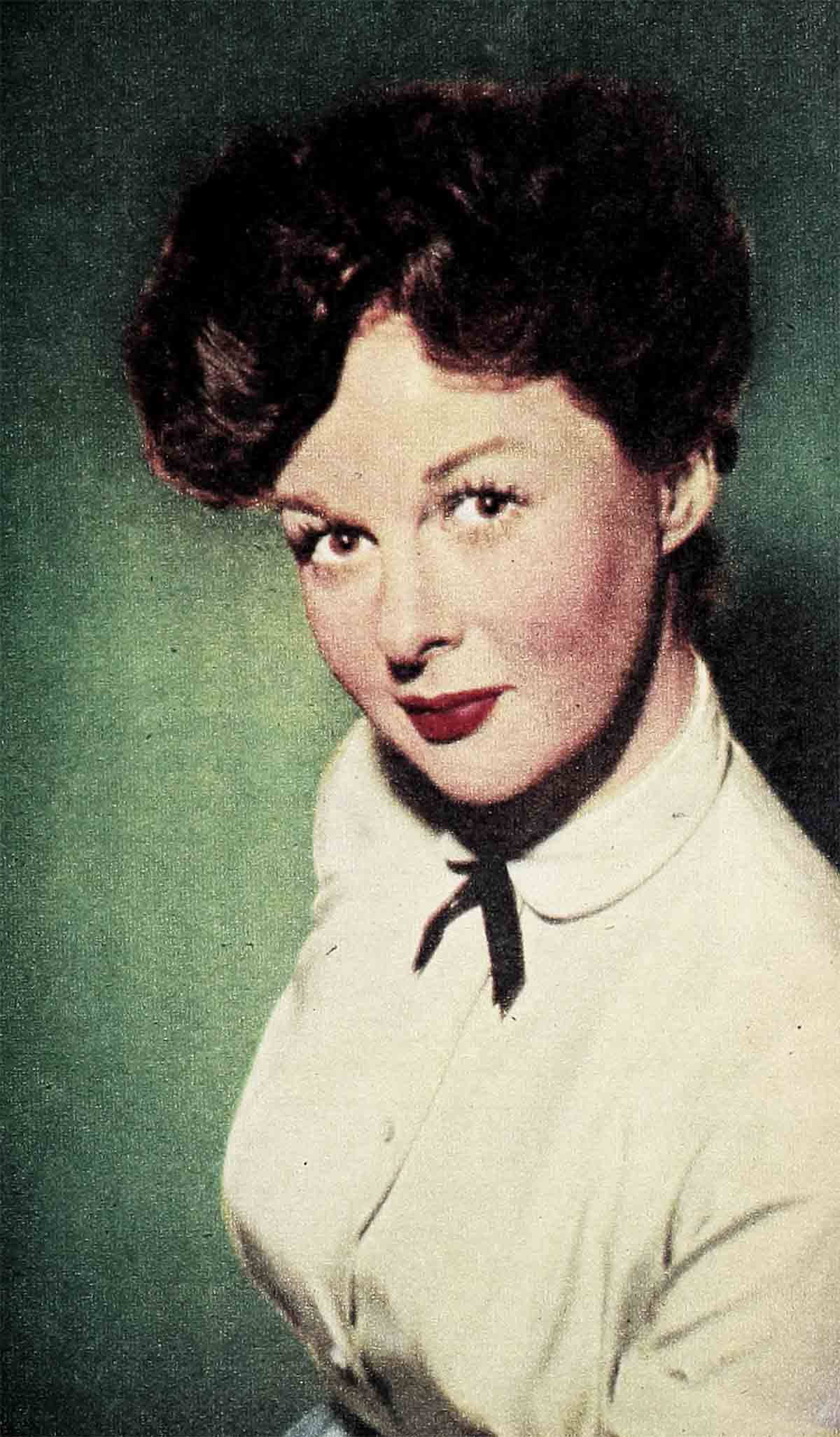
“At the time, she was a physical therapist for the Matson Line and often was away for weeks. But no matter how tired she was, when she came home she devoted hours to massaging and manipulating my legs. All her faith seemed to pour out through her strong hands.
“As we grew up, Mom automatically thumped our backs when she’d pass near us. Mine, as a reminder to stand straight—Walter’s, just for good measure! At thirteen I stood six feet and a half-inch tall. When i tested for my first screen role opposite Linda Darnell in ‘Island of Desire, Steffini Nordli, who’d written the original story, said: “This is the boy I want. He stands so straight and tall he’s right for the part. Did Mom get hysterical when I broke the good news? ‘I could have told you it was going to work out this way,’ she calmly said. And somehow or another, like so many mothers, she was right.”
Brooklyn born and bred, Susan Hayward’s heritage was a stout heart and relentless pride. She grew up, understandably, exuding an air of independence that masked her innermost misgivings. But Susan is capable of deep concern and she was deeply concerned over one of many problems resulting from her recent divorce.
When Susan Hayward’s twin sons joined the Cub Scouts and she became a Den Mother, it was a very important time in Susan’s life. Her Friday nights were reserved for those parent-scout meetings at the Dixie Canyon schoolhouse in San Fernando Valley. She would let nothing interfere, but as meeting time approached each week, something happened in Susan’s heart which was reflected in her face. Her young sons detected it and bluntly asked her to explain her sad expression.
“It’s this way, boys,” Susan said, trying to express her innermost thought. “Sometimes people think actresses are ‘different.’ They aren’t relaxed with us and they don’t treat us naturally. More than anything else I want to be like all the other mothers at your meetings. I am no different and I just wish there was some way I could let everyone know this is the way I feel.”
The Barker twins looked thoughtful and after a whispered conversation they confronted their mother.
“Why don’t you take a cake and a big pitcher of lemonade to the next meeting?” they suggested. “Then you’ll be like all the other mothers and you won’t have anything to worry about.”
Susan did. Susan is no longer worried!
Despite her obvious charms, Virginia Mayo felt lost and insecure when she arrived in Hollywood, and a big studio executive behind a highly polished desk pulverized her with fright. Hurdling this obstacle of fright, the successful beauty believes, is her number one blessing.
“I was under contract to Sam Goldwyn,” says Virginia, “and it was a crushing blow when he agreed to take up my option if I’d forfeit my raise. Somehow I had the courage to leave, but by the time I signed a contract at Warner Brothers, any studio executive looked like an ogre to me. I knew no one on the lot and lived in fear of being accused of some imaginary wrong-doing.
“Whenever I went to the studio, I ran into a pleasant-faced man who always smiled and spoke. It got so I considered him my one friend—a friend who probably held some small job, I thought.
“Then I received that fatal call to report to discuss my first assignment. I was sure I’d get brushed off. Isn’t it awful what negative thinking does to one’s morale? I think you know the rest of the story. Behind his highly polished desk sat my friend—the producer I was to see. All my feeling of inferiority slipped away and it’s never returned. I’ve never stopped being thankful.”
Loving life with warm enthusiasm, funerals fill Tony Curtis with sadness that clings indefinitely. Why then did he attend the funeral services of Universal studio’s Chief of Police Ernie Vache? Tony didn’t have to go. He wasn’t a close friend.
“I was there,” says Tony, “because I always try to count my blessings and Ernie certainly blessed me with kindness when I first arrived in Hollywood. Like all kids who played on the Bronx streets, I cringed at a cop’s uniform. When I checked in at U-I, a pass was supposed to be at the gate. It wasn’t there. Being such a greenhorn, my knees knocked when Ernie walked toward me. I expected to be arrested—expected everything a kid’s imagination could picture from a policeman. He listened to my story, believed it and let me come on the lot.
“From that day until he died, Ernie greeted me each morning with words of encouragement. When the studio kept me too late to catch the last bus, he unlocked some famous star’s dressing room and let me sleep in it all night. Ernie was a big man, an understanding man, with a wonderful smile that always set me up for the day. I went to his funeral because it was the last time I’d have the chance to express my gratitude to someone who was there when I needed him most.”
Count your blessings? Sure. Tony, Virginia, Tab, Terry are only a few persons who realize that the kindness of others makes a good today out of the struggles of yesterday.
THE END
It is a quote. PHOTOPLAY MAGAZINE JANUARY 1955




